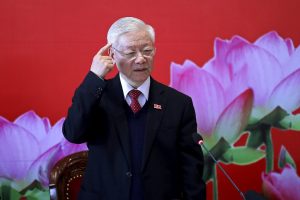Nguyen Phu Trong, the head of the Vietnamese Communist Party (VCP), will visit China next week on the invitation of Xi Jinping, fresh from the confirmation of his precedent-breaking third term as party chief, the two governments confirmed yesterday. Reuters reported that Nguyen Phu Trong’s visit to Beijing will take place from October 30 to November 2, citing a Vietnamese government report.
Trong will become the first foreign leader to visit China to greet Xi Jinping since he won a historic third five-year term in power at the 20th National Congress of the Chinese Communist Party (CCP), which concluded on October 23.
The Vietnamese party leader was among the clutch of leaders of communist and post-communist states – among them, North Korea, Cuba, Laos, and Cambodia – to dispatch instant congratulations to China’s leader in the wake of the National Congress, which sealed Xi’s dominant position within the Chinese party-state. In a message on Sunday, Trong expressed hope that his reconfirmation would “further strengthen political trust and set a great direction for future development of the relationship between the two countries.”
The fact that Trong is the first foreign leader to visit since the National Congress is not as surprising as it might seem. Despite the two nations’ headline-grabbing maritime and territorial disputes in the South China Sea, and the intense suspicion of much of the Vietnamese population toward China, a lot binds them.
China is Vietnam’s leading trade partner, and it is entwined in Chinese supply chains. In particular, its fast-growing manufacturing sector relies heavily on electronic components, machine parts, and raw materials from China. Of the $132.38 billion in bilateral trade that took place in the first nine months of this year, nearly 70 percent was imports to Vietnam. This heavy economic reliance gives the Vietnamese Party elites strong motivations for keeping relations on an even keel, and indeed, they have been strikingly successful in quarantining the South China Sea tensions.
While economics are obviously important, the chief binding agent in Sino-Vietnamese relations is the historic relationship between the two nations’ ruling communist parties, which date back to the first half of the twentieth century and bequeath a number of overlapping interests – not least the need to preserve communist rule in a post-communist world. In this sense, it is notable that it is Trong who is traveling to China rather than Prime Minister Pham Minh Chinh, the titular head of the Vietnamese government.
Even within the broader context of party-to-party relations, both Xi and Trong stand out in the context of their nations’ recent history. The Vietnamese party chief has held his position since 2011, a year before Xi was boosted into the same position in China. And while the nature of succession politics in the CCP and VCP differ greatly, Trong also finagled himself a surprise third term as party chief at the VCP’s 13th National Congress in early 2021. Trong also held the post of president between 2018 and 2021.
The meeting thus brings together two leaders who are confident of their domestic positions, and in broadly parallel positions within their own parties. As such, expect next week’s meeting to be heavy on party-to-party atmospherics and mutual praise, and to brush over the various points of contention in the bilateral relationship.

































